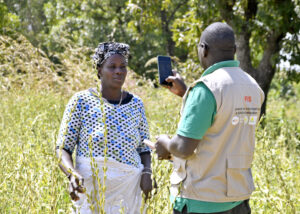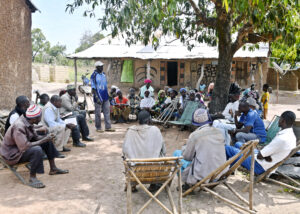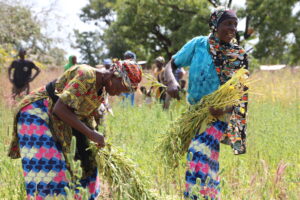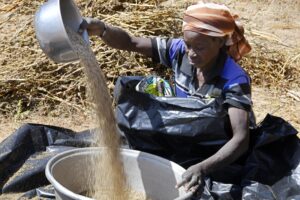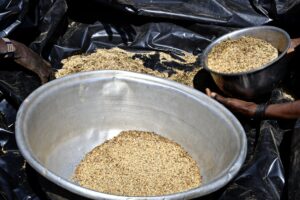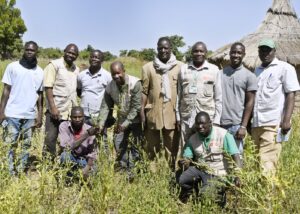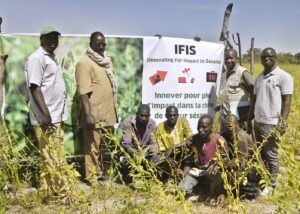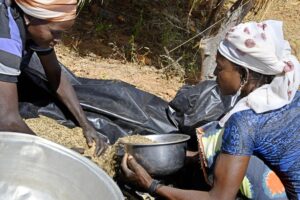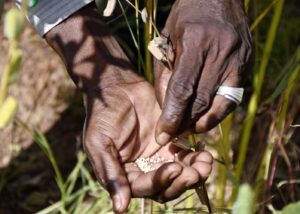Innovating for Impact in Sesame in Burkina Faso
In Burkina Faso and Mali, the sesame sector plays an important role in agricultural production. In 2020, these two countries produced 437,235 metric tonnes of sesame on an area of more than 700,000 hectares. The share of organic production is estimated annually at less than 1% of the total volume. This niche offers opportunities for additional income, soil improvement and health of producers.
The organic sesame value chain is very demanding in terms of quality and meeting the growing demand of business partners. Producers and their cooperatives are unable to meet demand due to the following structural constraints: 1) the organic producers, 2) low yields, 3) difficulties in tracing and meeting standards related to organic certification, 4) low grain quality due to pesticide contamination and salmonella.
The Innovating for Impact in Sesame project in Burkina Faso and Mali has stimulated the organic sesame value chain while developing a traceability system to create sustainable livelihoods, strengthen the resilience of smallholder farmers, and promote the environment.
Thanks to a public-private partnership led by ICCO part of Cordaid (now Cordaid, administrative partner in charge of coordination, development of business models), Afrique Verte Burkina (local NGO in charge of capacity building of producers on best production practices and post-harvest management and the use of the Management information system (MIS)) and the Commercial Partner OLVEA Burkina Faso (responsible for purchasing and development of the traceability system), the project has positively impact lives of small sesame producers and shea collectors
The implementation of the project has led to some very interesting results:
- Use of technical and technological innovations: This project enabled the digitization of the traceability process from production to marketing in 11 cooperatives with 35,178 producers (9,830 sesame producers and 25,348 shea collectors). The introduction of mobile payment in organic sesame and shea value chains has resulted in DKK 3,945,824.93 in 3 pilot cooperatives.
Sesame yields stabilized at 0.41 MT in 2022 compared to 0.35 MT in 2018 at the begining of the project. There was a threefold increase in the volumes purchased by the sesame trading partner from co-operatives. Sesame oil production of the trading partner increased by 67%, from 147 MT of oil (2018) to 219 MT in 2022.
- Inclusive business models: The project facilitated the development of business models for the sustainability of innovations through the strengthening of dialogue between actors (Cooperatives and business partner OLVEA) and links between Producer Organisations and, agro-dealers (inputs and equipment). OLVEA and the Cooperatives have set up a fund resulting from the sale of grains, oil and shea fines. This fund generated more than DKK 415 581.67. In the business model, the MIS fund supported the licensing, security, IT equipment, MIS maintenance costs to ensure sustainability.
- The promotion of innovations: The dissemination/communication on the tangible results of the project on the ground has made it possible to mobilize new donors for a scaling up of the project and amplify its effects. For example, the Deutsche Gesellschaft für Internationale Zusammenarbeit (GIZ) awarded an additional grant of DKK 7,273,869.75 to increase organic sesame production in Burkina Faso. In addition, the French Development Agency (AFD) has financed DKK 12,497,969 to scale up the MIS.
All these results have helped to improve the livelihoods of smallholder producers. The average gross income of sesame producers increased by 163% (from DKK 1,019.98 in 2018 to over DKK 2,680.24 in 2022). The reduction of impurities of 50% grain delivered allowed the cooperatives to benefit from quality premium with OLVEA BF. Finally, the implementation of the project facilitated the creation of 44 local independent jobs at the cooperative level, despite a context marked by the security crisis and the advent of COVID 19.
Administrative Partner ICCO Cooperation Key Commercial Partner OLVEA Burkina Faso Other Partners Afrique Verte Burkina Country Burkina Faso Sector Agriculture & agro-processing Open / Closed Closed Duration August 2018 - March 2023 Approval Year 2017



